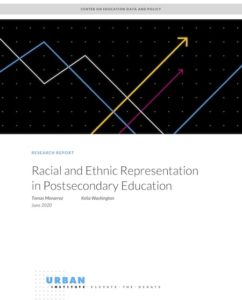 A new report from the Center on Education Data and Policy of the Urban Institute finds that while the U.S. population is becoming more educated, large gaps in postsecondary attainment based on race or ethnicity remain, particularly at more selective colleges and universities.
A new report from the Center on Education Data and Policy of the Urban Institute finds that while the U.S. population is becoming more educated, large gaps in postsecondary attainment based on race or ethnicity remain, particularly at more selective colleges and universities.
Researchers at the Urban Institute defined a “market” for each college based on the distance most students are willing to travel to attend different types of institutions. Then, they compared the racial and ethnic composition of the college with that of the college’s market. The measure of college representativeness is the difference in a racial or ethnic group’s share of college enrollment from that group’s share of the college market population.
Among the key finding in the report are:
* Black representation at nonselective and selective colleges is representative of schools’ pool of potential students, but Black students have been, and continue to be, severely underrepresented at more selective colleges.
* Black representation at public and private universities is nearly identical, meaning that public institutions do no better than their private counterparts at serving their communities.
* Black students are also overrepresented at for-profit schools by nearly 15 percentage points.
* Though overrepresentation of White students at more selective public universities has been decreasing since 2009, White students still tend to be overrepresented at more selective colleges.
The authors conclude that “our results indicate that a range of factors beyond local demographic composition affect a college’s student body composition. Admissions and tuition policies, state appropriations for higher education, beliefs about the value of college, and local labor market demand all play a role. To better understand the principal drivers of these gaps in representation, researchers, administrators, and policymakers need to better understand how structural racism and systemic barriers manifest in college admissions policies.”
The full report, Racial and Ethnic Representation in Postsecondary Education, may be downloaded by clicking here.

